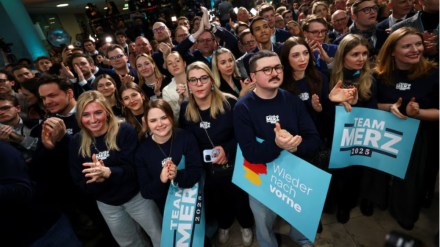Germany‘s conservative opposition leader, Friedrich Merz, won the national election on Sunday, but the outcome was far from resounding. The projected results indicated that his Union bloc garnered around 28.5% of the vote, a modest lead that leaves uncertainty about his ability to form a stable government.
Chancellor Olaf Scholz conceded defeat as his centre-left Social Democrats (SPD) faced their worst postwar election result, receiving just over 16% of the vote. This marks a significant decline from previous years and underscores growing dissatisfaction with his administration. The SPD’s poor performance follows the collapse of Scholz’s coalition government in November, which ended a tumultuous term marred by internal divisions and declining public support.
Political uncertainty
Merz has expressed his intention to form a coalition government by Easter, but this could prove difficult given the fragmented results. With the Greens polling at around 12% and the pro-business Free Democrats struggling at 4.5%, the coalition dynamics remain unclear. The hard-left Left Party saw a resurgence, reaching up to 9%, while the newly established Sahra Wagenknecht Alliance (BSW) hovered around the 5% threshold necessary to secure parliamentary representation.
AfD’s 20.5% result marks the strongest showing for a far-right party in Germany since World War II. Co-leader Tino Chrupalla celebrated the outcome, declaring that the party had entered the political mainstream. However, Merz has categorically ruled out any cooperation with AfD, citing stark differences on foreign policy, security, and European integration.
Merz criticises the US
Meanwhile, Merz pledged to help Europe gain “real independence” from the US as he works to form a government. Mainstream parties refuse to collaborate with AfD, which gained support from figures like Elon Musk. With no prior governing experience, Merz faces challenges as Germany struggles with economic stagnation, migration divisions, and geopolitical tensions between the US, Russia, and China. After his victory, he sharply criticised Washington’s “outrageous” campaign comments, likening them to Russian interference. Merz’s stance signals potential shifts in Germany’s transatlantic relations.
“So we are under such massive pressure from two sides that my absolute priority now is to achieve unity in Europe. It is possible to create unity in Europe,” he told a roundtable with other leaders.
Merz’s broadside against the US came despite President Donald Trump welcoming the election outcome.
“Much like the USA, the people of Germany got tired of the no common sense agenda, especially on energy and immigration, that has prevailed for so many years,” Trump wrote on Truth Social.
